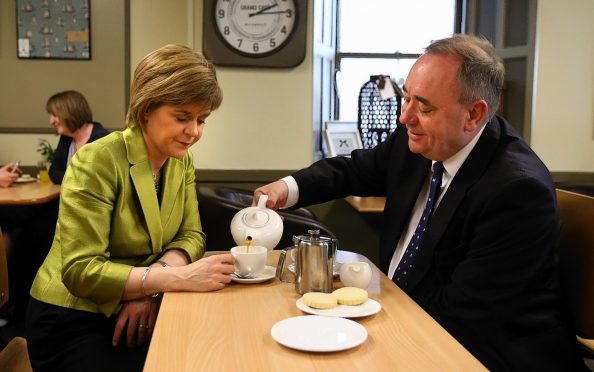Ten years ago today, the SNP came to power with Alex Salmond as first minister.
The vote in Holyrood took place almost two weeks after his party secured victory over Labour by the narrowest of margins.
Gordon candidate Mr Salmond said the SNP’s victory in 2007 was a “political revolution” after half a century of Labour rule.
He said: “It’s difficult for people now, after 10 years of an SNP administration, to appreciate what a political revolution it was.
“Labour had won every election in Scotland for 50 years, every single one, therefore although I thought we had a grand chance of winning, I stood in Gordon which was our 20th target seat.
“To win the election we had calculated we had to win 20 seats, so one of the reasons I stood in Gordon was to communicate to the party I believed we could win this.”
Beating Scottish Labour needed a more statesmanlike approach, Mr Salmond said, which meant he led a more positive campaign.
He said: “I changed my style and approach and tried to imbue that in the party.
“The SNP had been a very lively and successful opposition party… it’s one thing being a lively and sometimes noisy opposition, it’s quite different to get into the psychology of government.
“I was determined therefore in the 2007 election to change my ways a bit. I decided to take the campaign on to the positive and fight a campaign which heavily accentuated what we were going to do in government and the ideas we had.”
On the night of the 2007 election, regional list results from the Highlands put the SNP just ahead of Labour and the final results resulted in the SNP winning 47 seats – just one more than Labour’s 46.
Mr Salmond said: “The assumption of Labour control, which was one of the holy writs of politics, had been broken after half-a-century.”
On the 10th anniversary of the SNP getting its first taste of power, it’s clear this election result marked the beginning of Scottish Labour’s slide into third place at Holyrood last year, when they were pushed out of the official opposition seats by the Scottish Conservatives.
But looking at health, education and housing shows a mixed picture, with public services still struggling on.
Just last week the Press and Journal reported figures showing just under half (49%) of Scotland’s 13 and 14-year-olds are performing well in writing.
Teacher vacancies in the north-east have remain above 100 nearly 18 months after a crisis summit and college lecturers are about to enter are preparing to enter a fourth week of industrial action over pay and conditions.
On health, pledges to abolish bed-blocking have not been met and partnership work to provide more care in the community remains in its infancy.
The green shoots of a new house-building boom could be about to sprout but homeless people, like Aberdeen’s Matthew Bloomer, have died on the street after falling through the safety net.
After triumphantly sending 56 SNP MPs to Westminster in 2015 at their highest point, long-standing issues with vital public services could be about to tip the balance of power once again.
